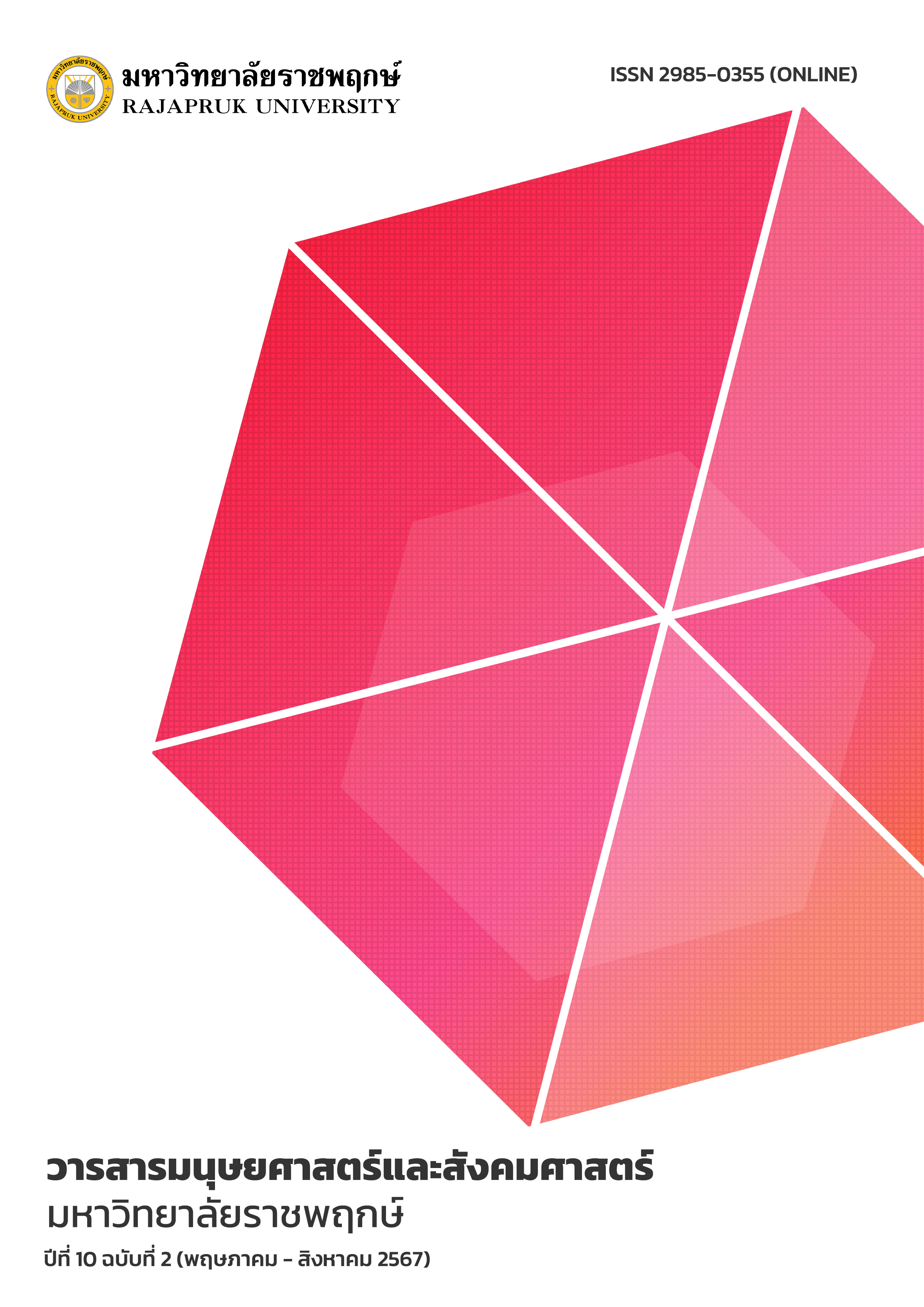Roles of Human Resource in Thailand’s Government Organizations in the Digital Era
Main Article Content
Abstract
ABSTRACT
This article aims to present the roles of human resource in Thailand’s government organizations in the Digital Era. Presenting the changes of Thai government organizations under the globalization trend, disruptive changes which occur in the digital aspect. It is a factor causing the concept of being the Thai government in the digital era (Digital Government) to increase the efficiency of government administration in this regard. Thailand in the digital age has affected the career disruption of human resource developers of Thai government organizations which must focus on the development of government personnel to be highly competent to change. The result of the study concludes that the roles of human resource professionals in Thai government organizations in the digital era are: 1) being a human resource professional who understands technology 2) being a strategic human resource management planner 3) being a communicator and coordinating internal operations organization and 4) being a management link and develop the potential of personnel in the digital era. In addition, human resource professionals in Thai government organizations in the digital era must focus on guidelines for the management and development of government personnel in the digital era, namely: 1) development of work ecosystems that promote and support learning and personnel development 2) Developing skills frameworks for working in the digital age and the 21st century and creating innovations that respond to mission-driven development plans, and 3) cultivating government personnel to have a learning framework. and self-development, focusing on the common good able to apply international principles appropriately and can operate effectively in a digital technology-driven environment.
Article Details
References
กันยารัตน์ จันทร์สว่าง และสุภาวดี พรหมบุตร. (2562). ทุนมนุษย์กับการเปลี่ยนแปลง: กระบวนทัศน์ใหม่ของการบริหารทรัพยากรมนุษย์. วารสารวิทยาการจัดการ, 6(2): 209-222.
ฉัฏฐ์สุดา ชัยโฉม จักรี ศรีจารุเมธีญาณ และชุลีพร นาหัวนิล. (2564). ระบบการบริหารราชการไทย. วารสารพุทธมัคค์, 6(1): 241-247.
ชัชชญา พีระธรณิศร์. (2563). ความท้าทายการจัดการศึกษาในยุค Disruptive Change ของผู้บริหารสถานศึกษา. ศึกษาศาสตร์สาร มหาวิทยาลัยเชียงใหม่, 4(2): 126-139.
ชัยรัตน์ ชามพูนท กมลพร กัลยาณมิตร สถิตย์ นิยมญาติ และทัศนีย์ ลักขณาภิชนชัช. (2564). การพัฒนาทรัพยากรมนุษย์ในยุคการเปลี่ยนฉับพลันทางดิจิทัล. วารสารครุศาสตร์ปริทรรศน์ฯ, 8(1): 195-208.
ธารทิพย์ พจน์สุภาพ และรุ่งอรุณ กระแสร์สินธุ์. (2564). การเปลี่ยนผ่านสู่ดิจิทัลและบทบาท ที่เปลี่ยนแปลงในการจัดการทรัพยากรมนุษย์. สักทอง วารสารมนุษยศาสตร์และสังคมศาสตร์ (สทมส.), 27(1): 1-19.
นิธิพร คงแก้ว และไอริน โรจน์รักษ์. (2564). ความพร้อมของบุคลากรสำนักทรัพยากรบุคคลต่อการเข้าสู่ยุค HR 4.0 กรณีศึกษา บุคลากรสำนักทรัพยากรบุคคลในบริษัทเจริญโภคภัณฑ์อาหาร จำกัด (มหาชน) กรุงเทพมหานคร. วารสารสังคมศาสตร์และมนุษยศาสตร์, 47(1): 161-174.
นิสดารก์ เวชยานนท์. (2551). มิติใหม่ในการบริหารทุนมนุษย์. กรุงเทพมหานคร: กราฟิโก ซิสเต็มส์.
บงกช เจนจรัสสกุล. (2564). วิวัฒนาการงานทรัพยากรมนุษย์ยุคดิจิทัล จากจุดเริ่มต้นสู่แนวโน้ม ในอนาคต. ใน จิรประภา อัครบวร (บรรณาธิการ). งานทรัพยากรมนุษย์ในยุคดิจิทัล. (หน้า 53-66). กรุงเทพมหานคร: ไซเบอร์พริ้นท์กรุ๊ป จำกัด.
บุญอนันต์ พินัยทรัพย์. (2563). การพัฒนาทรัพยากรมนุษย์ในยุคดิจิทัล. พิมพ์ครั้งที่ 2. กรุงเทพมหานคร: โรงพิมพ์รัตนไตร.
ประกาศ เรื่อง ยุทธศาสตร์ชาติ (พ.ศ. 2561- 2580). (2561, ตุลาคม 13). ราชกิจจานุเบกษา, 135 (82 ก), 1.
ประกาศสำนักนายกรัฐมนตรี เรื่อง การประกาศแผนการปฏิรูปประเทศ (ฉบับปรับปรุง). (2564, กุมภาพันธ์ 25). ราชกิจจานุเบกษา, 138 ตอนพิเศษ (44 ง), 1.
ประกาศสำนักนายกรัฐมนตรี เรื่อง การประกาศแผนแม่บทภายใต้ยุทธศาสตร์ชาติ (พ.ศ. 2561-2580). (2562, เมษายน 18). ราชกิจจานุเบกษา, 136 (51 ก), 1.
พระปลัดสมเกียรติ อํสุธโร อินถา ศิริวรรณ และระวิง เรืองสังข์. (2564). การบริหารงานบุคคลในยุคดิจิทัล. วารสารบัณฑิตศึกษาปริทรรศน์ วิทยาลัยสงฆ์นครสวรรค์, 9(1): 71-84.
พฤทธิพงศ์ จักกะพาก. (2564). การพัฒนาทุนมนุษย์ตามแนวทางรัฐประศาสนศาสตร์. วารสาร มจร สังคมศาสตร์ปริทรรศน์, 10(2): 354-363.
พลวศิษฐ หล้ากาศ. (2564). ประเด็นความท้าทายที่มีต่อบทบาทนักทรัพยากรมนุษย์ในอนาคต. วารสารวิจยวิชาการ, 4(2): 251-260.
พสุธิดา ตันตราจิณ พิไลพรรณ นวานุช ไกรภพ กฤตสวนนท์ และสุภัคศิริ ปราการเจริญ. (2559). ทุนมนุษย์: การพัฒนาทรัพยากรมนุษย์ในศตวรรษที่ 21. วารสารสุทธิปริทัศน์, 30(ฉบับพิเศษ): 115-123.
วชิรวัชร งามละม่อม. (2565). การบริหารจัดการทรัพยากรมนุษย์ภาครัฐในยุคดิสรัปชัน. วารสารวิชาการ มหาวิทยาลัยหอการค้าไทย มนุษยศาสตร์และสังคมศาสตร์, 42(1): 176-197.
ศิริพร แย้มนิล. (2563). การพัฒนาทรัพยากรมนุษย์ที่ยั่งยืน. กรุงเทพมหานคร: DPU Coolprint มหาวิทยาลัยธุรกิจบัณฑิตย์.
สำนักงาน ก.พ. (2563). หนังสือสำนักงาน ก.พ. ที่ นร 1013.1/167 ลงวันที่ 21 กันยายน 2563 เรื่อง แนวทางการพัฒนาบุคลากรภาครัฐ พ.ศ. 2563-2565. นนทบุรี: สถาบันพัฒนาข้าราชการพลเรือน.
Barney, J. B. (1991). Firm resources & sustained competitive advantage. Journal of Management, 17(1): 99-120.
Christensen, C. M., McDonald, R., Altman, E. J., and Palmer, J. E. (2018). Disruptive Innovation: An Intellectual History and Directions for Future Research. Journal of Management Studies, 55(7): 1-36
HR NOTE. (2562). บทบาทใหม่ของฝ่ายทรัพยากรมนุษย์ในยุคดิจิทัล (New Roles of HR in Digital Age). ค้นเมื่อ วันที่ 20 พฤษภาคม 2565, จาก
https://th.hrnote.asia/personnel-management/190902-hr-roles-digital-age/.
Shakil, R. M., Hassan, M. A. and Qureshi, M. I. (2019). Understanding the Relationship Between HR Roles and HR Effectiveness: A Conceptual Review. Management Research Spectrum, 9(1): 78-82.
Ulrich, D. and Dulebohn, J. H. (2015). Are we there yet? What's next for HR?. Human Resource Management Review, 25(2): 188-204.


